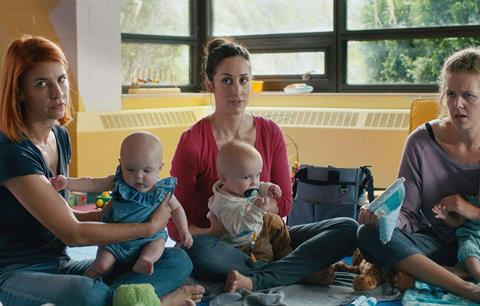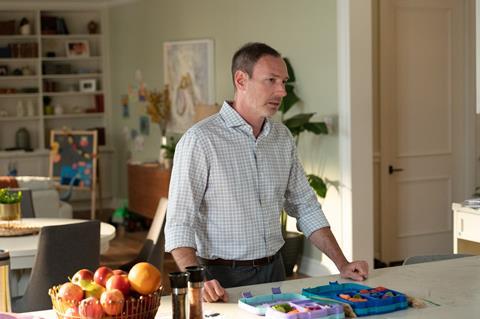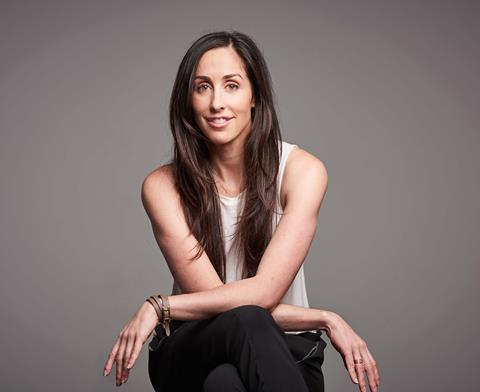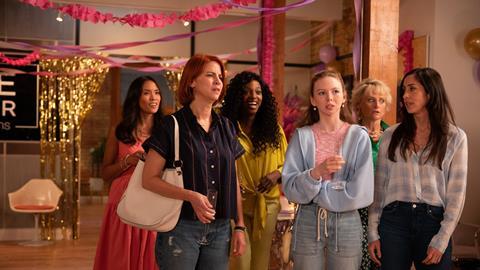As CBC-Netflix comedy Workin’ Moms kicks off its final series, its creator reflects on how a primarily female team helped capture motherhood in all its messy details

Catherine Reitman is happy to let go. Workin’ Moms – the series that she created, has written, showrun, directed for, and starred in for 83 episodes, across seven series and seven years is drawing to a close with the final series launching today (26 April) internationally on Netflix.
“There’s elements that are bittersweet,” she tells Broadcast. “This is the job I’ve done for nearly a decade. I’ve raised my children on the show. But it’s also wonderful that we get to end it this way - being able to give these characters the justice they deserve and to make it as rewarding as possible for the audience, made it really satiating for me.”
The Canadian comedy, originally commissioned for the country’s main public broadcaster CBC, has become a global hit for Reitman and her production label Wolf + Rabbit Entertainment, which she set up with husband and co-star/on-screen husband, writer and director Philip Sternberg, to make the show.
Workin’ Moms follows a group of high-flying women juggling pressured jobs, intense romantic relationships with husbands and partners and friendships while, of course, staying on top of parenting their gaggle of variously aged children. The comedy, which Reitman originally drew from her own experiences, has tackled abortion, misogyny in the workplace, healthcare – and much more.
Reitman plays PR boss Kate Foster, with Sternberg as Nate Foster, Dani Kind as best friend Anne and a principally Canadian cast including Sarah McVie, Jessalyn Wanlim, Ryan Belleville, Enuka Okuma, Nikki Duval and, previously, Dan Aykroyd and Juno Rinaldi.

While some critics have pointed out the privilege the characters enjoy, and the middle-class aura that suffuses the show, this has not darkened its global reception from viewers and industry observers alike. The series has yielded two international Emmy nominations, while Reitman has been honoured with individual gongs from top Canadian awards The Gracies – presented by the Alliance for Women in Media – for showrunner on a fictional comedy, best comedy direction and acting.
Speaking to Broadcast ahead of Workin’ Moms’ final curtain, Reitman says the end is more of an affirmation of the series’ success than a disappointment.
“Having been largely an out-of-work actress for as long as I was, and doing on-and-off shows that got cancelled mid-season, to get the opportunity to control the end of your story is so rare,” she says.
Consequently, Reitman continues to marvel at how the show has evolved from its genesis, which she explains was her “telling the rawest, most three-dimensional version of what it was for me to be a working mother”.
She says: “I didn’t see anything like that on TV. Philip and I were watching shows that were either overly dramatic or really hard ‘diaper splat’ comedies.
“There’s a joke-per-minute requirement for comedies that we don’t really subscribe to. The jokes come naturally and organically from the situation.”
“When I started the series I didn’t even have my eye on what makes it funny. When we got the greenlight, I was in such disbelief that I felt I’ll probably get one season and I just have to rock out and tell the most authentic version of what this has been for me.”
But as the series mounted up, Reitman notes that the comedy has “gotten punchier” and the show is “faster-paced”, so much so that series seven feels like a different machine.
“The jokes definitely service us better, in the writers’ room and on the [production] floor when there’s real stakes involved, when it’s grounded in something [truthful],” she says. “As opposed to just going a joke for joke’s sake. Usually there’s a joke-per-minute requirement for comedies that we don’t really subscribe to. It’s absolutely crucial the jokes come naturally and organically from the situation.”
Reitman emphasises she is firmly in the camp of comedies making people laugh. Nevertheless, she appreciates that comedy is a mixed ecology of outright belly-laugh shows and dramedy pieces – and Workin’ Moms straddles the range.
“Sometimes I feel like pizza, and sometimes I feel like sushi, and there are moments where you want just a big old laugh, and moments where what feels the most respectful thing for me is that small joke in between two very real moments,” she explains.
“This is the brand of comedy that I want to make with this story. That’s not to say that I don’t want to make harder comedies in the future and more sincere dramedies also. There are certainly elements of Workin’ Moms that are dramedy, I can’t deny that.
“But it’s a journey. I always tell our newer directors you can’t look at a scene in isolation. You have to see it as the 22-minute ride that the show is. And so, when there’s scenes where we’re left feeling that it went a little bit heavier and real, we need something lighter: let’s get Lionel [the endearing and often slapstick husband of Anne, played by Belleville] or other characters that function to relieve the tension.
“You bring some levity in the same way as a mother might have a heavy ‘holy crap’ moment and then their kid says the funniest thing and they shake it off.”
“Hiring women is not a risk”
Despite the show’s evolution – Reitman says series seven fleshes out the idea of male birth control and men taking on the same responsibilities as women – the focus on the female experience, with stories told through the female lens, has been critical. Two-thirds of the creative team on the final series are women, including both showrunners (Karen Kicak and Jessie Gabe), while 75% of the writing staff are female and there is a 50/50 split on directors. The writing team includes Gabe, Kicak, Reitman and Okuma alongside Daniel Gold, Aidan O’Loughlin, Masooma Hussain and Linsey Stewart, while the directors are Yael Staav, Vivieno Caldinelli, Kind and Romeo Candido.
“We have some pretty sensitive subject in our stories and having women there, particularly behind the camera, really helped make it feel like a safe environment for the actors.”

Reitman is unwavering in her conviction that this set-up has contributed to the show’s success.
“We have exceptional men on our crew, for the record, but it is such a reward having a largely female crew,” she says.
“I never felt like I was needing to make any kind of sacrifice, or any kind of point [to promote my view]. I initially wanted to make the point ‘we must be all female’, but then it just became a lovely thing.
“I’m absolutely guessing what the negative assumption would be [from parts of the industry] for having a largely female crew, that it would be cattier or more emotional, and I did not experience that.
“We have some pretty sensitive subject in our stories and having women there, particularly behind the camera, really helped make it feel like a safe environment for the actors to go there, for the camera operators to get in there. I hope, at least from my perspective and from the feedback I heard, we only benefited from it.”
“In the same way I can watch Walter White make meth, even though I’m not a drug dealer, I imagine a teenage boy can watch these mums and relate to the struggle as real.”
This viewpoint is emboldened by Workin’ Moms’ broad viewership. The show doesn’t singularly skew female, says Reitman.
“It became apparent, particularly at Netflix, when we would get the details of our demographics that our audience was predominantly co-viewing, male and female, that it varies in age beyond what I would have ever considered, that a huge chunk of our audience doesn’t have children, it’s wild,” she says.
“In the same way I can watch Walter White make meth, even though I’m not a drug dealer, I imagine a teenage boy can watch these mums and relate to the struggle as real. We just want to watch a compelling story.”
That said, she says it is “depressing” to read figures from the European Audiovisual Observatory, released on the day we are speaking, showing that female representation in scripted TV is still progressing extremely slowly, with female-driven teams particularly suffering.
“I wish I could change more; I can only do it show by show here. I absolutely intend to continue to hire women,” she says.
“It’s really discouraging to hear that the numbers are where they are, and they continue to be. It breaks my heart, because stories will benefit from it. I genuinely believe that, because I’ve experienced it for nearly a decade.
“If people were to try, they will find it is not the risk they believe it is. Hiring women is not a risk. It is an incentive and it’s a benefit to your story.
“There is a littered landscape of interesting mum stories now on TV. And I credit the fact that I think people are more interested in watching female stories. I’m seeing it happen.”
With Workin’ Moms bowing out, the eye is on Canada for the next comedy to fill this void.


































No comments yet